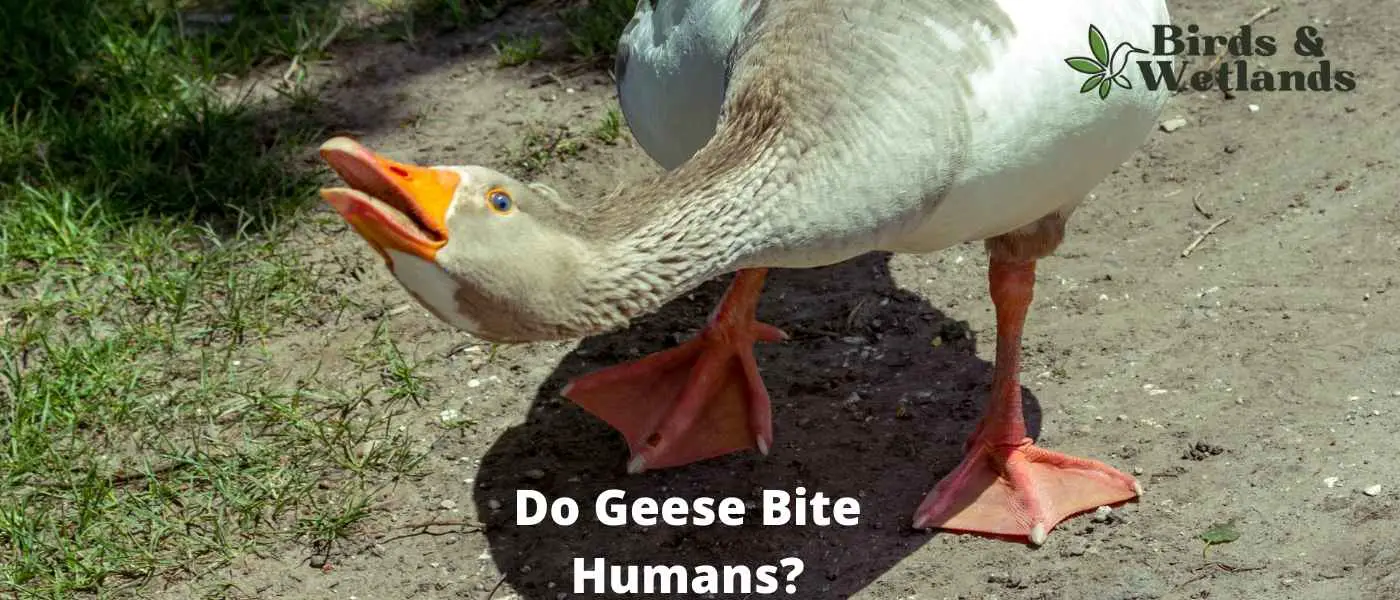Geese are generally calm and non-aggressive. But they can become aggressive when defending their territory. When a goose feels threatened, it may lash out with its beak or wings. While geese rarely cause serious injuries, their bites can be painful and their wings can pack quite a punch.
If you find yourself in the middle of an angry goose attack, the best thing to do is to back away slowly and maintain eye contact while using your peripheral vision to watch out for obstacles. Avoid making sudden movements or loud noises, as this may escalate the situation. In most cases, the goose will eventually lose interest and move on.
Are Geese Dangerous?
Geese are generally considered to be gentle creatures. However, they can be fiercely protective of their nests and young, and will not hesitate to attack if they feel threatened.
While most goose attacks on humans result in relatively minor injuries and few bruises or scratches, some can be much more severe. In most cases, injuries occur as people flee to avoid geese attacks.
There have even been reports of emotional distress, severe injuries, head injuries or head trauma, broken bones, and concussions.
Therefore, it is important to exercise caution when around nesting geese, and to avoid disturbing them unnecessarily.
Do Geese Bites Hurt?
Though they are often considered to be harmless, geese can actually deliver quite a painful bite. Their beaks are sharp and their wings are powerful, so getting hit by one can be quite hurtful. In addition, their feathers can be irritating and may cause allergic reactions in some people.
A goose-attack injury can also include a broken nose because of their powerful wings. They can also cause bruises and pain.
While most goose bites are not serious, they can sometimes lead to infection. It is important to wash any wound that a goose has inflicted with soap and water. Seek medical attention if the swelling does not subside within a few days.
How to Stop Goose Attacks
Geese are generally friendly birds, but if they feel threatened they may attack. The best way to avoid attacks is to keep your distance from these birds.
However, if you find yourself in a situation where a goose is aggressive, it is important to know how to defend yourself.
- Back away slowly and avoid making any sudden movements if a goose begins acting aggressively toward you. They pay close attention to body language.
- Don’t turn your back or shoulders away.
- Maintain direct eye contact while facing your body directly towards the goose.
- Remain calm and keep a neutral demeanor.
- Avoid showing any signs of hostility.
- Do not try to hit, kick, or swing at the hostile goose, as this will only make the situation worse because the other bird may attack you as well.
- If possible, try to put something between you and the goose, such as a bag or a piece of clothing.
- If the situation escalates and the goose flies towards you, cover your face and head with your arms and hands to protect yourself from its beak and claws.
- If there is more than one goose involved in the attack, try to make yourself look as large as possible by spreading your arms and legs.
- If geese are becoming a problem at your home or business, report the issue to your local Department of Natural Resources. It is difficult to entirely prevent geese if you live in an area where they are prevalent. However, measures can be taken to minimize attacks.
How Can You Tell if a Goose Is Aggressive?
There are several warning signs that a goose is about to attack. The first is when the goose bends its head back slightly. This is a sign that the goose is feeling aggressive and may attack. If the goose begins to pump its head up and down, this is another sign that it is about to attack.
The goose may also hiss or honk as part of its threat display if it is becoming aggressive.
If you see any of these warning signs, it is best to keep your distance from the goose.
Keep in mind that geese act aggressively if they feel threatened. Their instincts compel them to act this way.
Why Do Geese Attack Humans?
Geese are large, waterfowl that are commonly found near ponds and lakes. While they are generally peaceful animals, they are territorial birds. This means they can become aggressive when they feel threatened, especially when they breed during early spring.
One of the most common reasons for goose attacks is simply because the animal feels territorial and does not want to share its nest and space with humans or other animals. And it’s not different from other species of wild animals.
Geese are also known to be protective of their nest and young and will attack if they feel that their offspring are in danger. In some cases, geese may also attack out of fear or insecurity.
Most geese will become aggressive if humans get too close to their nest. It is the gander’s job to provide protection against predators as the female stays in the nest with the eggs during the incubation period.
The gander stays nearby and stands guard. It will give a warning call and try to chase the potential predator if it gets too close to the nests.
Conclusion on Can Geese Attack You
In conclusion, geese can and will bite humans if they view us as potential threats. Aggressive domestic geese can be territorial and may attack people who come too close to their nest or young.
While the bites of these animals may not cause minor or no injuries, they can still be painful and frightening even if they don’t have real teeth.
If you encounter an aggressive goose, it’s best to give it a wide berth and avoid provoking it further.
FAQs on Attacking Goose
Is It Dangerous to Feed Wild Geese?
Wild geese are beautiful creatures that many people enjoy seeing in their natural habitats. However, it is important to remember that these animals are wild and should not be fed. There are a few reasons why feeding geese in the wild is not recommended.
For one, they may lose their natural fear of humans and become used to being around us. This means they will build their nests close to humans.
Additionally, not feeding them helps keep a safe distance between us and them. It is also crucial not to give wild geese food because this will make them lose the ability to find food on their own.
Feeding wild geese on a regular basis can lead to their overpopulation. When geese are well-fed, they tend to lay more eggs, and this can cause the population of geese to balloon.
Additionally, if you’re feeding wild geese bread or other high-carbohydrate foods, you may also be inadvertently causing them to spread diseases. That’s because a diet rich in carbohydrates can cause birds to defecate more, and this can help bacteria to spread.
Are Canada Geese Aggressive?
So what are the problems with aggressive Canada geese? Spring is the breeding season for these waterfowl species.
Canada geese are large, waterfowl that are found across North America. While they are generally peaceful birds, they can become aggressive if they feel threatened.
Giant Canada geese will hiss, charge, and even bite if they perceive a person or animal to be a threat. This behavior is most often seen during the nesting season when the birds are trying to protect their young.
However, it is important to remember that Canadian geese are wild animals and should not be approached too closely.
If you see a Canadian goose acting aggressively, it is best to give it a wide berth and avoid getting too close.
Are Geese Protected Species in the USA?
it is important to know the laws surrounding these birds. In the United States, it is illegal to harm geese without permission from the U.S. Fish and Wildlife Service (USFWS). This includes harming the birds, their eggs, or their nests.
However, it is legal to harass or scare away geese as long as they are not harmed in the process.

Jim Addison is an avid bird watcher and has been obsessed with the activity since he was a young boy.
He has traveled all over North America in search of new and interesting species to observe, and his detailed knowledge of the subject makes him a sought-after expert on the topic.

